Investing lessons from the NBA
The 2023 NBA Playoffs have been fantastic. I've always enjoyed listening to interviews and post-game press conferences with NBA players and coaches. It's fascinating to hear them discuss their game plans, the challenges they face, and the adjustments they need to make.
While watching this year's playoffs, I started thinking about how much investors can learn from the NBA and apply it to the game of investing. Here are some intriguing aspects that caught my attention.
Games of Outliers
The NBA is a game full of outliers
The NBA is a team sport, typically consisting of 15 players on each team's roster. Despite this, there are typically only one or two players - aka outliers - that make the most significant contributions to winning.
NBA players already stand out as outliers, representing the top ~0.0001% of the global talent pool, along with most professional athletes. However, even within this highly talented group, there are notable outliers in terms of their contribution.
Throughout NBA history there have been a total of 4,797 active NBA players. Over this period, these players have collectively scored 13.4 million points. However, a significant portion of the scoring has been achieved by only a handful of players. For instance, the Top 100 Players (based on scoring) represent just ~2% of the NBA's overall population, yet they have accounted for over 16% of the total points scored in NBA history.
The Median Player within the Top 100 has scored just under 20,000 points throughout their career. This compares to the median NBA player, whose career points total is just 661. The Median Top 100 player’s scoring contribution was 30x greater than the median NBA player.
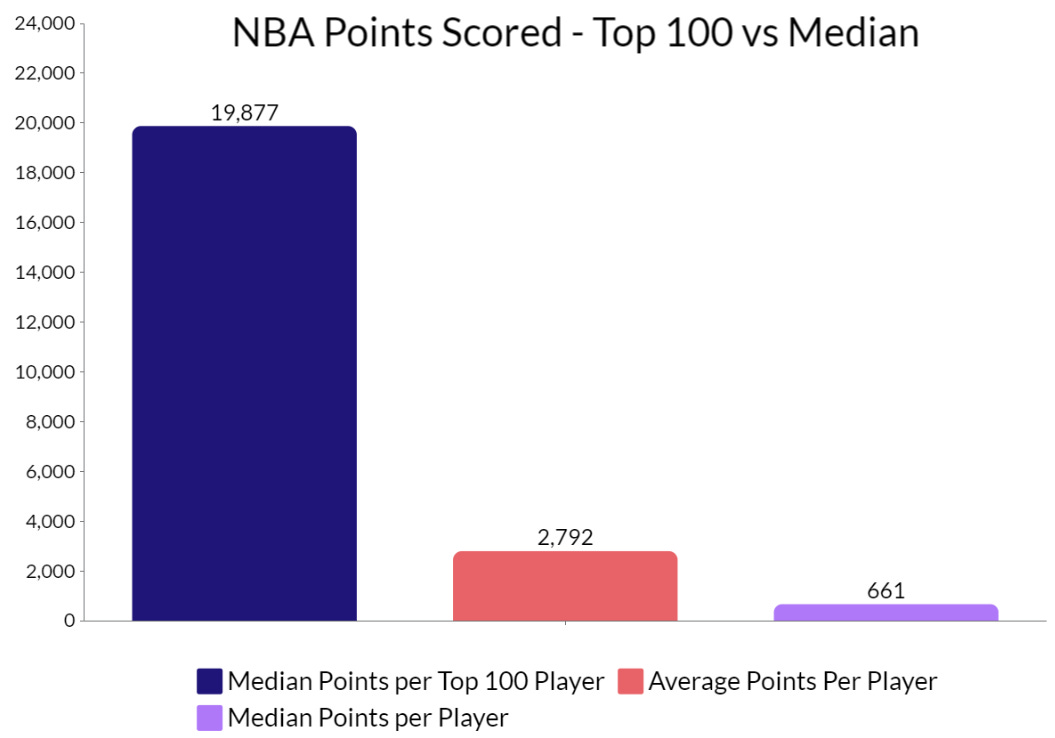
There’s a similar outlier dynamic when you look at Most Valuable Player (MVP) awards. The MVP is a yearly award that’s (typically) given to the most impactful player on one of the leading teams. There have been 68 MVP awards in the NBA’s history, but just 5 players have won over 35% of all MVP awards.
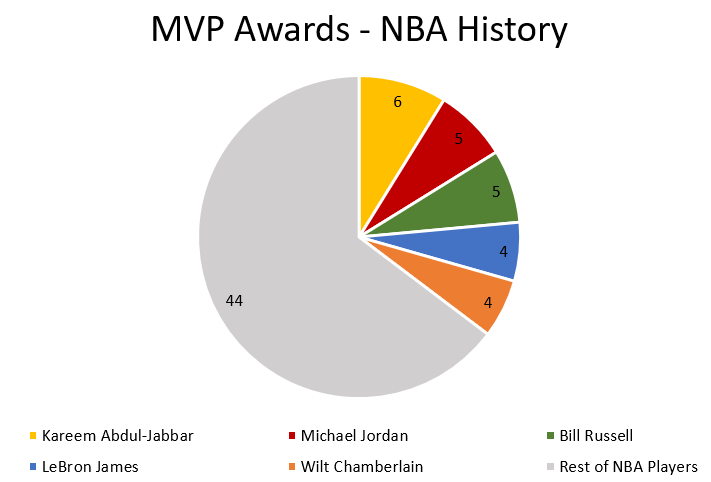
There are also plenty of outliers at the team level. In the NBA there are 30 teams, and each year one team wins the championship. Over the last 30 years just 4 teams have won 63% of the championships.
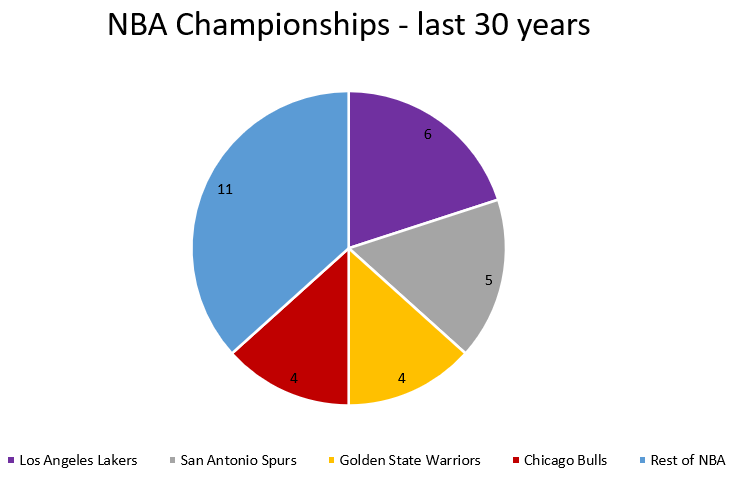
Investing is also full of outliers
The outlier dynamic is way more pronounced in investing. Warren Buffett - one of the investing GOATs - recently stated that in his 58-year investing career, only 12 decisions or investments had driven the bulk of his returns. Over Berkshire’s 58 year history they had probably made close to 300 individual investments, which implies a 4% hit rate. It is amazing that 96% of the investments made by one of the world’s greatest investors turned out to be duds. This shows the impact that outliers have on investment returns.
“At this point, a report card from me is appropriate: In 58 years of Berkshire management, most of my capital-allocation decisions have been no better than so-so. In some cases, also, bad moves by me have been rescued by very large doses of luck . . . Our satisfactory results have been the product of about a dozen truly good decisions – that would be about one every five years” Warren Buffett - 2022 Shareholder Letter
There is also empirical data which affirms this outlier dynamic. An expansive study by Hendrik Bessembinder looked at the performance of 25,300 US public companies over the period of 1926-2016. The study found that the Top 90 performing companies (0.36% of companies) accounted for over half of the wealth created, and the top 4.3% of companies (1,092) were responsible for all of the wealth creation.
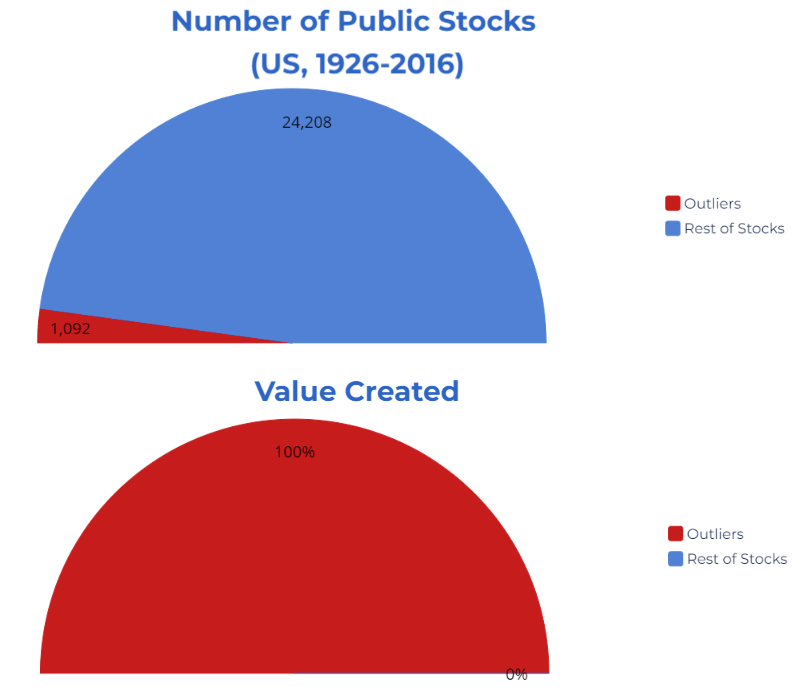
Source: Fuji Kapital, Data based on Hendrik Bessembinder’s study
A separate study by Vanguard showed that between 1987-2017, the average return of a stock in the Russell 3000 Index was 387%. However, the median stock only returned 7% over that 30-year period, losing value when accounting for inflation. Over that period, 47% of all stocks in the Index had been unprofitable investments, while only 7% of stocks had cumulative returns in excess of 1000%.
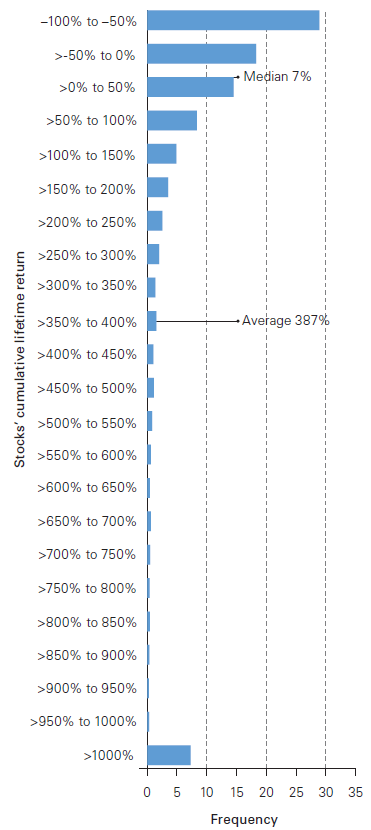
Source: Vanguard
The studies show that Warren Buffett’s experience is not an anomaly. Only a select few of outliers – or compounders – drive the bulk of investment returns.
The thing that all those outlier investments have in common is growth. In the short term, market noise and sentiment are key drivers of a stock’s performance (i.e., multiple expansion & contraction). However, over the long run, growth is the most important factor that creates value. Companies that can sustainably compound their earnings / free cash flow over the long run will increase in value.
That’s why my personal approach to investing revolves around finding businesses with meaningful long-term growth potential. Companies capable of sustaining such growth are more likely to be outliers and generate outlier-like returns.
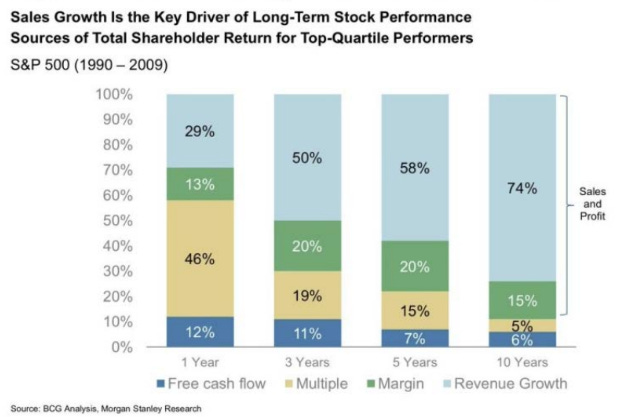
Losses are Part of the Game
This section might read like a motivational pep-talk for investors, but it's important to recognize that investing, much like sports, can be an emotional endeavour.
Here are some great clips of all-time great NBA players discussing how they have dealt with losses and adversity.
The greatest players in the league constantly dealt with adversity. Early in Michael Jordan’s career he kept losing in the playoffs and there was constant chatter that he might never win a championship. LeBron James was constantly berated for failing to win an NBA championship with many media outlets claiming that he wasn’t clutch (i.e., perform when it matters the most).
Investing can also be full of adversity. There will be investments that fail, there will be misjudgements, and there will be bear markets. As highlighted in the previous section, with only 4% of stocks in the US' history responsible for creating the majority of value, a significant proportion of individual investments are bound to be losers. Losses are a feature of investing, not a bug. Managing emotions, taking the L, and dealing with adversity are key traits for investors. Furthermore, these losses hold some intrinsic value as they provide abundant opportunities to learn from mistakes and grow.
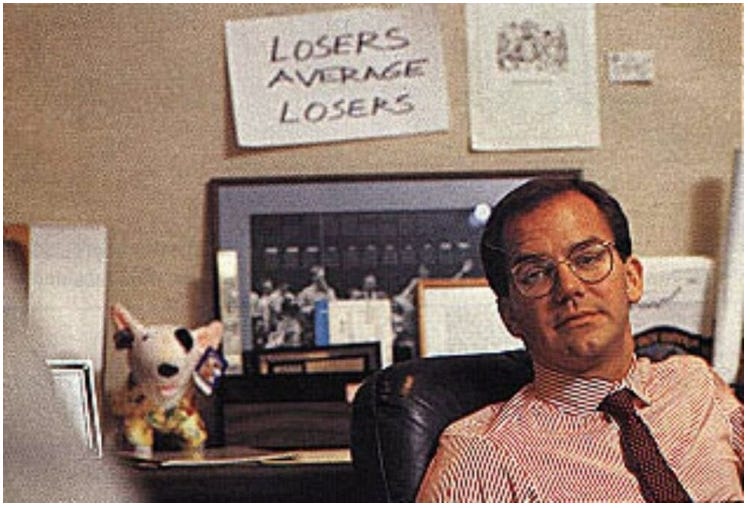
Losers average Losers - Paul Tudor Jones’ approach to dealing with ‘failure’. Source: Financial World, July 11, 1989 Photograph by Alex Quesada/Matrix
Staying Ready - Always Learning
While the NBA is a star driven league (aka outliers), the non-stars play an important role in a team’s success. There are many role players on a team that do not get playing time. However, these role players must constantly train, improve their game and stay ready as they never know when their number might be called.
Jeremy Lin was an undrafted young NBA player that was struggling to find a roster spot and was bounced from team to team. Jeremy Lin had to sleep on his friends couch while fighting for a roster spot on the New York Knicks. Due to an unforeseen injury on the Knicks roster, an opportunity opened for Jeremy Lin. He ended up going on an incredible scoring tear with the Knicks and this period became known as Linsanity.
Despite not having a permanent roster spot, Jeremy Lin had to constantly train and hone his craft as he never knew when he would get an opportunity. When his number was called, he was ready and went on to have a successful NBA career.
Investing is very similar to being an NBA role player. Just like a role player, constantly learning (training) is essential. Investors are always assessing new businesses, industries, and emerging technologies as the investment landscape is always evolving. Being able to adapt and learn is critical for investors to continually make well informed judgements and take advantage of opportunities that present themselves.
There are many styles to win - Play to your strengths
There are many different playing styles in the NBA. I previously highlighted how just four teams - Lakers, Spurs, Warriors and Bulls - had won 63% of the championships over the last 30 years. Those teams had very different playing styles, but they always played to their strengths:
- The Lakers have been star driven, relying on strong performances from legends like Kobe, Shaq, and LeBron to win championships.
- Spurs have a somewhat boring, but highly effective and mechanical style to basketball.
- The Warriors have won with a fast-paced, perimeter orientated game.
- The Bulls had Air Jordan.
The same goes for investing. Despite what I said earlier about compounders creating all of the value, there are many of ways to win in investing. There are investors that try and find those compounders; there are contrarian investors that never buy compounders and hunt for struggling companies; there are investors that only look at charts; and there are investors that only focus on macro.
There have been many investors that have generated significant returns under each of their respective strategies and areas of expertise. In my view, investors should play to their strengths.

